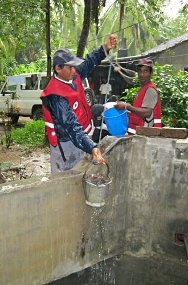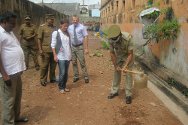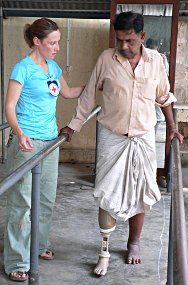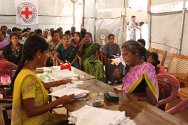Sri Lanka: ICRC steps up cooperation with the Sri Lanka Red Cross Society
20-04-2011 Operational Update
The ICRC recently closed its two last field offices in Jaffna and Vavuniya at the request of the Sri Lankan government, and since 1 April has been operating exclusively from Colombo. Enhanced cooperation with the Sri Lanka Red Cross Society (SLRCS) will enable the organization to continue vital humanitarian programmes for people affected by the past conflict.
Introduction
The ICRC continues to run its family visits programme in conjunction with the SLRCS, helping families keep in touch with detained relatives by providing them with travel allowances so they can travel to the places where their relatives are held.
In Vavuniya district, the ICRC and SLRCS are setting up a pilot project that will provide households (mostly single-headed) affected by the conflict with micro credits, vocational training or grants to help them restart their livelihoods.
ICRC teams continue to make regular visits to the main prisons, which are holding people in relation to the recent conflict. The ICRC submits confidential reports to the authorities, to ensure that detainees are being treated in accordance with international standards and domestic law.
On the Jaffna Peninsula, the ICRC provides the Jaffna Jaipur Centre for Disability Rehabilitation with technical and material support, enabling the Centre to fit patients, including mine victims, with artificial limbs. The Centre is currently looking after some 2,000 disabled people.
The ICRC continues to promote IHL with the Sri Lankan authorities and among influential members of society, such as academics. The aim is to ensure the inclusion of humanitarian norms in the rules and regulations of the armed forces and police, especially in view of Sri Lanka's role as a major contributor to United Nations peacekeeping operations around the world.
Detainee welfare
ICRC staff have been visiting places of detention throughout the country since 1989, on the basis of a Memorandum of Understanding with the Sri Lankan government. During the confidential discussions with the authorities that take place during the visits, ICRC staff seek to ensure that the treatment of detainees and their conditions of detention meet international standards and comply with domestic laws.
Between January and March 2011, the ICRC:
- made 52 visits to 47 places of detention and met privately with over 2,000 detainees;
- provided over 2,800 detainees in temporary and permanent places of detention with toiletries, clothes and games;
- provided over 4,500 families of detainees with travel allowances under the family visit programme;
- paid for eight released detainees to return home on public transport;
- collected 99 Red Cross Messages (containing brief family news) and distributed 152 to detainees and their families;
- built or renovated 61 toilets in Welikada Remand Prison;
- provided 17 two-wheeled tractors and 100 agricultural toolkits to the open-prison camps in Anuradhapura, Batticaloa, Polonnaruwa, Pallanseana, Hangilipola and Wariyapola so that prisoners could grow food;
- supplied 26 artificial legs to the Boossa detention centre through Sanasuma, a local non-governmental organization providing prosthetic services.
Working in partnership with the Sri Lanka Red Cross Society
The ICRC continues to work closely with the Sri Lanka Red Cross Society and other partners within the International Red Cross and Red Crescent Movement to address humanitarian needs.
Between January and March 2011, the ICRC:
- provided 164 two-wheeled tractors and 1,370 toolkits, enabling the SLRCS to help more than 5,000 farmers in the Batticaloa, Trincomalee, Ampara, Anuradhapura, Polonnaruwa, Matale and Moneragala districts begin rebuilding their livelihoods after their crops were destroyed by flooding;
- trained 75 SLRCS volunteers to clean flood-contaminated wells in the Ampara, Batticaloa and Polonaruwa districts; as a result, the SLRCS was able to clean over 125 wells, benefiting more than 500 families.
Supporting the Jaffna Jaipur Centre for Disability Rehabilitation (JJCDR)
The JJCDR is currently looking after 2,000 disabled people, mainly from the Jaffna Peninsula. The Centre was founded in 1987 as the Jaffna branch of the Friend in Need Society and has been functioning separately since 2001. The ICRC provides the Centre with supplies, including raw materials such as polypropylene and components for building artificial limbs. A resident ICRC technical advisor supports Centre staff in the production of artificial limbs and orthotic devices. The ICRC physiotherapist who has been based at the Centre since the end of 2010 has trained two assistants and supervised moves to provide services for those who cannot come to the Centre. At least 70 patients received physiotherapy between January and March 2011. The ICRC plans to continue its support to the Centre until 2014.
Between January and March 2011, more than 433 patients benefited from the Centre’s services, and during that period the Centre:
- produced 96 artificial limbs for amputees, including victims of landmines and other explosive remnants of war, with 19 of the artificial limbs going to detainees;
- produced almost 50 orthoses for disabled people other than amputees;
- provided 54 crutches and sticks, plus five wheelchairs;
- provided a transport allowance so that patients requiring artificial limbs could get to the Centre.
Promoting compliance with international humanitarian law
To promote awareness of and respect for international humanitarian law, the ICRC conducts training sessions and holds briefings for academics, the authorities and members of the armed forces. It also organizes national and regional moot-court competitions on international humanitarian law.
Between January and March 2011, the ICRC:
- held 11 briefing sessions on international humanitarian law for 55 civilians and 1,745 army, navy and air force personnel, including 1,158 Sri Lanka Army personnel who were being deployed on peacekeeping operations in Sudan;
- sponsored the participation of the mooting team of the Open University of Sri Lanka in the 9th Red Cross IHL Moot Competition for the Asia Pacific Region in Hong Kong.



